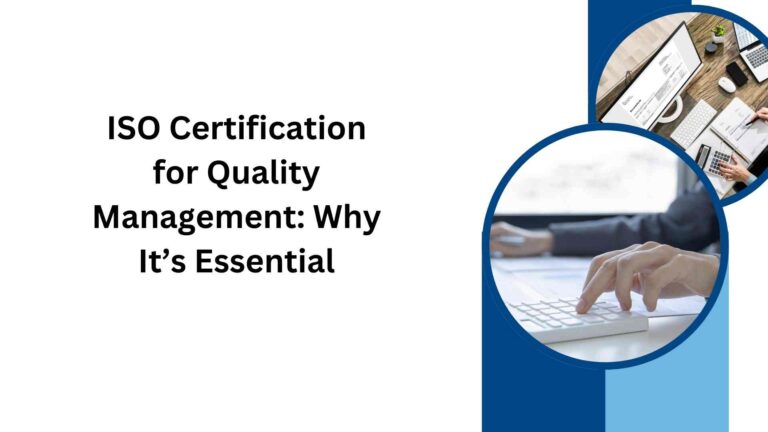In today’s competitive global marketplace, delivering high-quality products and services has become more critical than ever for businesses of all sizes. One of the most recognized ways to demonstrate commitment to quality and continuous improvement is by obtaining ISO certification, specifically ISO 9001 Certification, the internationally recognized standard for quality management systems (QMS). This certification is essential for businesses aiming to establish a structured approach to quality, enhance customer satisfaction, and improve operational efficiencies. This article will explore the importance of ISO certification for quality management, its benefits, and how it can lead to long-term success for organizations.
What is ISO Certification for Quality Management?
ISO 9001 certification is a part of the ISO 9000 family of standards, which focuses on quality management systems. Published by the International Organization for Standardization (ISO), ISO 9001 specifies requirements for a QMS that organizations can use to ensure consistent quality in their products or services. The standard is based on several key principles of quality management, including customer focus, leadership, engagement of people, process approach, improvement, evidence-based decision-making, and relationship management.
A company that achieves ISO 9001 certification demonstrates its dedication to these principles, thereby assuring customers, employees, and stakeholders that the organization has a systematic approach to quality management and is committed to meeting regulatory and customer requirements.
The Importance of ISO Certification for Quality Management
1. Enhanced Customer Satisfaction
One of the primary objectives of ISO 9001 certification is to enhance customer satisfaction by consistently meeting or exceeding customer expectations. Quality management is centered around understanding customer needs and requirements and then working to fulfill those needs through standardized processes. With ISO certification, businesses are better equipped to provide products and services that meet quality standards, reduce errors, and maintain reliability, ultimately improving the overall customer experience and loyalty.
2. Improved Operational Efficiency
ISO 9001 certification requires organizations to establish well-defined processes and clear documentation for each step in their operations. This standardization reduces variability in production or service delivery, minimizes errors, and enhances overall operational efficiency. By focusing on improving processes, organizations can reduce waste, optimize resource allocation, and achieve higher productivity levels. This efficiency not only saves time and costs but also contributes to better employee satisfaction and productivity.
3. Better Decision-Making through Data-Driven Processes
A critical element of ISO certification is the emphasis on evidence-based decision-making. ISO 9001 encourages organizations to collect, analyze, and act on data to make informed decisions. This data-driven approach reduces the likelihood of costly mistakes and enables organizations to identify areas for improvement effectively. By relying on factual information rather than assumptions, businesses can make strategic decisions that improve quality and operational performance.
4. Increased Marketability and Competitive Advantage
ISO certification serves as a powerful marketing tool and can significantly enhance an organization’s credibility and reputation. Many businesses, especially in industries like manufacturing, engineering, healthcare, and technology, prefer working with ISO-certified suppliers and partners. An ISO-certified company can gain a competitive advantage by assuring clients that they meet internationally recognized quality standards. This certification can be a deciding factor when businesses choose suppliers, as it demonstrates reliability, accountability, and a commitment to quality.
5. Greater Employee Engagement and Motivation
ISO 9001 certification emphasizes the involvement of all employees in quality management and continuous improvement processes. When employees are aware of the organization’s quality objectives and understand their roles in achieving those objectives, it fosters a culture of responsibility and accountability. Engaged employees are more likely to be motivated, perform better, and actively contribute to process improvements. Furthermore, having clear, well-defined procedures helps employees feel more confident in their roles, leading to increased job satisfaction and productivity.
6. Effective Risk Management
Quality management through ISO 9001 also involves identifying, assessing, and managing risks. By adopting a risk-based thinking approach, organizations can proactively address potential issues before they become significant problems. This approach not only enhances product or service quality but also improves the organization’s resilience to unexpected challenges, making it more adaptable and responsive to market changes. Effective risk management also instills confidence in customers and stakeholders by assuring them that the organization is committed to maintaining high standards.
7. Continuous Improvement and Innovation
ISO 9001 certification is not a one-time achievement but a continuous process that requires regular assessments and improvements. Organizations are encouraged to keep evaluating and refining their processes, which leads to innovation and constant enhancement of quality standards. By establishing a culture of continuous improvement, ISO-certified businesses can stay ahead of industry trends, adapt to new technologies, and respond more effectively to customer needs. This ongoing process fosters an environment where improvement and innovation are integral parts of the organization’s ethos.
Note: You can also Apply for ISO 14001 Certification from our website
Conclusion
ISO certification for quality management is more than a badge of honor; it is an essential tool that drives operational excellence, enhances customer satisfaction, and provides a foundation for continuous improvement. For organizations looking to differentiate themselves in a crowded market, ISO 9001 certification offers a significant advantage, building trust and credibility with customers, suppliers, and stakeholders alike. By committing to quality management standards, businesses can improve their performance, reduce costs, and create a culture of accountability and innovation.

